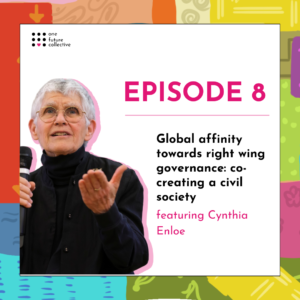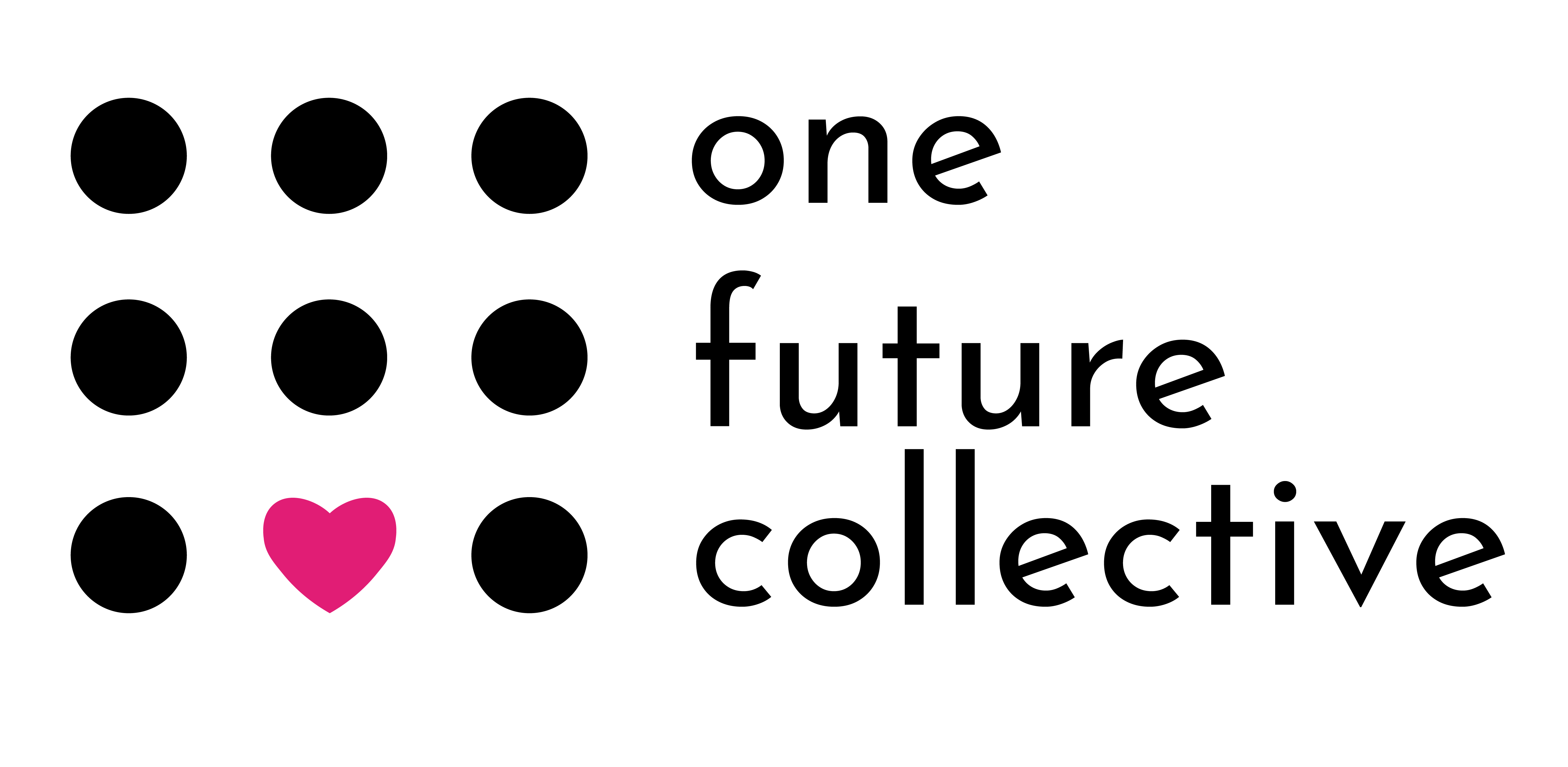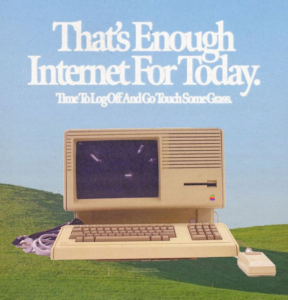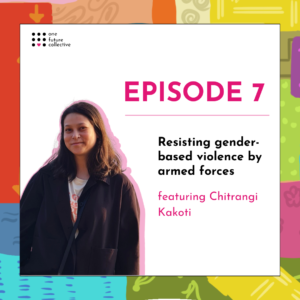Uncuff India Episode 8: Global affinity towards right wing governance: co-creating a civil society
In this episode, we explore the global rise in right wing governance and what this translates into for social justice and human rights movements across different socio-political contexts. Our remarkable guest Dr Cynthia Enloe also touches upon citizen responses to the resurgence of right-wing governance. Cynthia Enloe is a Research Professor of Politics and Women’s Studies at Clark University in Massachusetts. Her teaching and writing have explored feminist questions about the interplay of patriarchy and militarism in women’s lives around the world. Her writings have been translated into Turkish, Japanese, Spanish and French. Among her books are “Bananas, Beaches and Bases: Making Feminist Sense of International Politics” and “Manoeuvres: The International Politics of Militarizing Women’s Lives.” Her latest book, “Twelve Feminist Lessons of War”, released in September this year.

Transcript
Sanchi- Hello everyone and welcome to our podcast Uncuff India by One Future Collective. My name is Sanchi and my pronouns are she, her.
Uttanshi- My name is Uttanshi and my pronouns are she and her. We are your hosts today and it’s so good to have you all listening in. In today’s episode, we will explore the global rise in fascism and what this translates into for social justice and human rights movements across different socio- political contexts. In particular, we will explore whether and how this global rise is tied to the rise in violence against different minority groups around the world.
Sanchi- Yes, and we do know that the marked shift in global politics towards right wing governance is undeniable today and is abetted by different factors. Even in countries where the government is not currently in power, that is, a right wing government is not currently in power, the steady rise in the popularity of right wing leaders continues. In most instances, the shift is not complete or possible without the backing from the citizens, and of course the manifestations of this are context specific. But on the whole, this paints a bleak picture for the future of social justice.
Uttanshi– To discuss this and share their insights on the topic with us, we have with us Cynthia Enloe. Cynthia Enloe is a research professor of Politics and Women Studies at Clark University in Massachusetts. Her teaching and writing has explored feminist questions about the interplay of patriarchy and militarism in women’s lives around the world. Her writings have been translated into Turkish, Japanese, Spanish and French. Among her books are Bananas, Beaches and Bases: Making Feminist Sense of International Politics and Maneuvers, The International Politics of Militarizing Women’s Lives. Her forthcoming book is 12 Feminist Lessons of War, which will be released in September this year. Cynthia, we are so excited to have you join us and learn from you as a part of this conversation. Thank you so much for taking the time out to be able to do this.
Cynthia– Well, I’m delighted to be here with you both and to be with the One Future collective overall.
Sanchi– Thank you so much, Cynthia and welcome once again. It is an absolute pleasure to host you at this podcast today and we are really looking forward to learning with you. So without further ado, let us jump in. And let’s begin by making a distinction between fascism and neo-fascism. Cynthia, do you think there is a marked difference between these two? How would you define them?
Cynthia– Well, to tell you the truth, when I really look at the rise of the right, I tend to use militarized patriarchy- that’s what I actually track. I think fascism is a very useful term. I think neo-fascism is the updated modernized, you know, every right wing movement in the world updates itself. You know, modernization happens in all kinds of areas of social life. Sometimes, modernization is a good thing, sometimes it is just the updating of a very dangerous trend. So for me, neo-fascism is simply the updated version of what Mussolini tried to do in the 1930s in Italy. So, but for me, what I really track is all forms of militarized patriarchy and the ways in which I use- we can talk about this, but I use patriarchy in very gritty terms. It’s not an abstract idea. It’s the way people are pushed to live their lives and the militarized version of that is what is particularly dangerous. And I watch that very, very carefully in India and in, you know, China and in the US and in any country.
Uttanshi– Thank you for sharing that insight, Cynthia. And while you were speaking, you know, I was very interested by your tying in patriarchy with the institution of the rise of fascism. And do you want to tell us a little bit more about why that relationship is relevant at all?
Cynthia– Yes, absolutely. I think most right wing movements and right wing governments and usually those right wing governments come out of right wing movements. So you should, as you said in your introduction, we should watch the movements first, before they become a political party or before they gain electoral strength and become a government, or just via a coup d’etat, become a government. I use patriarchy to mean the privileging of not all masculinities and you in the One Future collective know this that there are varieties of masculinity, some of which are disempowered and marginalized and exploited. Patriarchy privileges very particular kinds of masculinities, not just one, and it then marginalizes, but depends on varieties of marginalized masculinities and virtually all kinds of femininities. And so what I’ve watched over the years, and I’m very indebted to feminist historians. I’m not an historian. I’m pretty ignorant about history. So, it takes a lot of feminist historians from all over the world to teach me about how right wing movements always, always seek support from women and they seek that and patriarchy on Zoom. So you can’t hear it, you know, but you can see a patriarchy depends on certain kinds of women’s attitudes and certain kinds of women’s practices and certain kinds of women’s understandings of the world. I mean, that’s the good news. The good news is if patriarchy depends on certain kind of women’s attitudes towards themselves, then that means patriarchy is weak because if you can change women’s minds about their possibilities, about their autonomy, about their rights, if you can change women’s minds, you can weaken patriarchy and the militarization of patriarchy.
I mean, I don’t want to be sanguine here. I don’t. But the more I learn about right wing movements, the more encouraged I am about the kind of work you all do to undermine these presumptions amongst women about what they have to fear and what amounts to security and who protects them and patriarchy depends on women thinking that men are their protectors, that other women are a danger, especially feminist women and women from marginalized groups. Patriarchy depends on women’s imagining that they have very limited possibilities, and they should be grateful for whatever they have, and they should be grateful to their male protectors. You can undermine every single one of those arguments, but the right wing depends on that and we know this from feminist historians who studied the rise of fascism in Germany and looked at why some women were very attracted to it. We know this from historians of Italy. Who looked at why women? Some women in Italy found Mussolini so attractive and his vision so attractive. We know this from Brazilian sociologists who look at which women in Brazil in the last 20 years supported Bolsonaro. And in India you have wonderful ethnographers, sociologists, political scientists, anthropologists who have looked at which women and why have been supported the BJP and other Hindu nationalist movements. And we need to know that. I mean, it’s very important for those of us who are alarmed about and in opposition to militarized patriarchy, right wing movements. It’s really important that we take seriously why some women find those movements reassuring. We may be alarmed at their ideas about protection and their ideas about security and their ideas about belonging and pride. We may be alarmed about their ideas, but we’d better pay close attention. And we better treat those women. I would almost maybe not respect that’s, but we should at least engage to find out well, what is it they find so fearful? I’m very interested in fear, and fear is always gendered. And so to answer your question, I think I’m interested in militarized patriarchy and right wing movements and right wing governments because they are so dependent on women’s support and that can be transformed and changed.
Sanchi– Thank you so much. I think lots of things came up when you were talking, but you did give us some concrete examples of some movements in the past and also current movements where women’s support has been essential to these rank right wing movements and then to right wing governance. Would you like to maybe throw some light for our listeners on what are some reasons, the why that you talked about, why do some women then support these regimes? And a follow up question that maybe you could also take along is do you think the rise of the right wing, the global rise of the right wing, has it had any impact on violence against minorities? And maybe we could club these two and think about them together.
Cynthia– Yes, You might have to remind me so that’s a big question, right. So let’s start with from what we know and we know this- we know this from a lot of very good researchers and movement researchers as well, I mean not just scholarly researchers and one approach is to manipulate religious belief. And that’s not just true in India, it’s true in Poland and it’s true in the United States. It’s true in Brazil, and that is and it’s true in Turkey, that is, that right wing movements appeal to women through their identification with certain religious faiths and that appeal is I, from what I understand, you know, that appeal is double- sided. On the one side, they claim that is the leaders of these right wing movements trying to appeal to women who identify through religious faith. They try to convince those women that their faith is under threat and one of the ways they do that is to argue that a secular State, a State that is not committed to the advancement of any particular religious faith, a secular state which India was founded to be and the United States is supposedly a founded to be that a secular state, this is the right wing argument, is a threat to their belief whereas the whole underpinning of creating a state that is secular is that it will not be a threat to anybody’s religious belief. That’s the real point of a secular State. A secular State is a State that is not a threat to anybody’s religious belief, but the right wing takes secularism, as if it’s a danger. So, one has to really take that on and talk very clearly and very specifically in very concrete terms about what a secular state is and what it is not. The second fear that is pumped up is that other faiths are a threat to the women’s own faith. Now, the reason that religion and femininity are so tightly connected is because in many cultures, many different kinds of cultures, religion is thought to be especially important to women. I mean, you see that like who goes to church, who goes to temple, who goes to synagogue, it’s oftentimes a high percentage of women who do the unpaid work to support the local religious organizations. And it’s presumed that that is an area that women can serve a useful purpose outside the home. And so for a lot of women, religion, especially established religion, is an outlet. An outlet from domestic confinement. You can support your local religious organization outside the home and keep your respectable femininity status. Respectability is a well, it’s weaponized. I think feminine respectability is held over women to police them because no woman ever, any woman who loses her public status as respectable is a woman who’s endangered. So “women being allowed” to take active social life within a religious organization gives women an outlet. And that means that women are, in many cultures, including my own, are thought to be especially invested in the safety of their faith, and that is played upon by the right wing, usually male but sometimes female is played upon by right wing fear mongers. The other thing is that women because respectable femininity in most of our cultures, really assumes that women’s primary obligations are in the domestic space, in the space of the family and the household. Right wing movements, usually by men, but sometimes by women who, of course, because they’re movement activists, they actually don’t spend much time in the domestic space. So, it’s very hypocritical, but they then argued to women that they’re appealing to is that the domestic life is being threatened by somebody, local minorities, foreign entities and so because women are so domestic confined, women have a big stake in protecting what they think is the proper family is the family that they have invested in, the family that they feel they their sense of belonging is rooted in. And so the other thing that right wing movement leaders do is claim that “the family” and because there are many different, I mean one of the great advantage of advances by feminists around the world is to expand the notion of what your family is. My guess is if each of you were said, well, what did you used to think your family is and what do you think your family is now? My guess is the One Future Collective is your part of your family now, right? Right. And for me, the local women’s movement here in Boston- that’s part of my family, right. I mean, that’s one of the great things that feminists have done. They’ve said, well, family matters. It’s a kind of emotional investment and emotional obligations, but what is the family is big and it changes and it’s not based on some notion of limited purity, you know, and so right wing movements.
Also woo women, court women by claiming that the family narrowly defined by then, is under threat.
Uttanshi– Yeah. Thank you for sharing these very important insights because I think oftentimes when we speak about right wing governance structures, we tend to think that there are very clear differences in who supports what movements and this really sets the tone for the follow up question which was do you think that there is an increase in right wing government systems across the world and has this has this increase also correlated to an increase in the violence that is being committed against minorities from different parts of the world? Do you think that there is a correlation between this? If yes, what according to you shapes this?
Cynthia– Well, I don’t think we should ever imagine that right wing movements ever went away. They were defeated in World War II. They were defeated in Japan, they were defeated in Italy, they were defeated in Germany. So there are and, but I think these appeals and this fear mongering, the right wing really depends on fear mongering that is encouraging people to be fearful, they lurk. I mean, they’re behind American racism, right? They are behind nationalist, narrowly defined, very narrowly defined nationalist movements in Russia. So, I think we are now in a moment, all of us on this planet, when, in fact, this patriarchal fear mongering is gaining new adherence. And maybe it’s precisely because feminist, informed, progressive movements have made such strides, I mean, Europe now has the Istanbul Convention, which is a major new European amongst the European states for the prevention of violence against women. Well, that scares a lot of conservatives, the Istanbul Convention, it scares Polish conservatives. It scares Hungarian conservatives and so the progress that we’ve made through the United Nations, which I realize is a very complicated, flawed, sprawling institution. But there are now treaties, agreements, institutions that really broaden the notion of family, make illegal domesticated violence that expand women’s rights and that has really that progress I think has stirred up the newest generation of right wing movements. So we should in some ways we shouldn’t be that surprised when real progress in social justice and inclusion happens. Those who had been kind of comfortable in the old oppressions, in the old limitations, in the old exploitations, people who’ve been comfortable in that get riled up. And in some ways it says every time we make, we generally you and me and everybody who really believes in the big family, in rights, in genuine security, in peace. We shouldn’t be that surprised. We should be ready, and I mean ready with ideas, ready with organizations, ready with reframed understandings, with new kinds of education because it will come, it will come. And I think your point about minorities, of course, sometimes minorities rule. So, a minority by itself isn’t depressed. You know, as you said, it’s we’re talking about marginalized minorities. We’re talking about the Kachin in Myanmar, right? Marginalized minorities, whether they be sexual or ethnic or religious or economic. Marginalized, exploited, excluded minorities are oftentimes the Rohingya in Myanmar are the ones that the right wing thinks it is. Right wing is lazy, you know, they choose to fearmonger about groups that have the least capacity, the least resources to respond. I mean none of us my guess is you’d have to be honest. Maybe I’m the only one of the three of us, but none of us ever listened to Rohingya intellectuals or Rohingya social leaders until they were oppressed and treated violently in Myanmar. And then we all list. So they didn’t have the resources until we all became alarmed and we only became alarmed when they were being treated with violence, and I think violence is always most justified if you think the people being treated with violence have no rights and if you have no rights then and you are and you are considered a threat, that combination you have no rights. You’re not fully human and even though you’re marginalized, you’re a threat. I mean, the right wing is very creative. You know, really, you have no rights, you are marginalized, but you are a threat. Then you can be treated violently and nobody cares. That’s the argument. What surprises the right wing is when we all speak up and say, actually we do care. We do care. They are us. We are them. As the Danish people said when the Nazis came in, we are all Jews, but we are all Rohingya. If I’m not Rohingya, who am I? And that surprises the right because the right depends on us not caring. The right depends on us being so in love with the narrowest kind of sense of belonging that we will shrug off violence being used against people. But when the three of us say I am Rohingya, violence against the Rohingya or Kashmiris or Native Americans or Indigenous Australians, that is violence against us, that really surprises the right. They count on us having a very, very narrow sense of belonging. And sometimes we do, you know.
Uttanshi– Sanchi, do you want to come in?
Sanchi- Alright, okay. Thank you so much for sharing all of that with us. I think it’s been so powerful to realize that the right feeds off when we do not care. And it’s so important to realize that solidarity can be a big answer back to the movements of the right. And I think it’s been really powerful listening to you talk about that. And I am wondering, is there, is there a place in this world or can we imagine, is it possible to have a world where this militarized patriarchy that we’ve been talking about, is it possible for this to coexist in any way with human rights, with social justice? Is that even possible?
Cynthia- I think it works the other way, Sanchi, I think you can’t have human rights unless you demilitarize and depatriarchalize, if that’s a word roll back patriarchy. Patriarchy depends on hierarchy. Rights depend on dismantling hierarchy. Patriarchy depends on one group of people, men, certain kinds of men being the protectors and women being grateful for men’s protection and you can roll that back. It is possible, and it happens all the time. If I was just reading about the the most recent before the Putin Russian military invasion of Ukraine. In Ukraine, there was vibrant politics again, all of us now running to learn, and maybe you there in Helsinki are learning more than you ever imagined about Ukraine, right? But before that, there were vibrant politics in Ukraine, even though most of us weren’t paying attention. And in 2014, the Ukrainian general public rose up in US Pro Democracy movement and they focused on the central square, the central Plaza of the capital city Kiev. And that central Plaza is called the Maidan Maidan, which is another word for Plaza. And so it’s called the Maidan Revolution of 2014, and it’s been renamed by Ukrainians as the Revolution of Dignity. Isn’t that interesting? The Revolution of dignity, all right, which is about rights and belonging and respect and listening and transparency. The Revolution of dignity and when you listen to people who were there at the Maidan, they say this- answer your question. Is it possible to say it felt like for the first time we had genuine civil society? All kinds of people who didn’t fear each other and went for mutual support, right. All kinds of people who had never done anything collectively together, all of a sudden needed each other and they said and they organized, they were highly organized in the Maidan and this is December 2013 into January and February 2014. And that’s one of the things they all said to each other at the Maidan, we created civil society. And what they meant by that was not simply, well, I mean, they did, but not simply a social movement against the autocracy of the current government at the time that’s back in 2014, but rather they’re feelings for each other and the closest that I’ve well, this isn’t, this shows my ignorance of Indian politics. So you know but it was the pro citizenship women’s led movement in India and my friend Amrita Basu who maybe some of you know and Amrita who’s a long time friend and she did loads of interviews with women at the pro citizenship demonstration and they said much the same. It was true of some of the farmers demonstrations too, right, That there was more gender division of Labor there actually, but there was this sense of we are, we are right here in this space.Creating what might be possible if we had a genuine civil society, listen to Hong Kong pro democracy people who’ve now been quashed by the Xi government in Beijing. But if you listen to the pro democracy activists in Hong Kong, they said in 2019 and early 2020, before we were oppressed by the Beijing Security forces, we had the feeling of what was possible. So I think we need to hold on to not just feel those feelings. Feelings are good, but also how did we do it? How did we learn to trust each other and build a civil society and keep that with us? There are lessons out of that.
The Egyptians who were into Here Square during the 2011 Arab Spring, they said exactly the same thing, said women. Egyptian women said my God, I’ve never been in a big public crowd where I wasn’t sexually harassed, so there was no sexual harassment in to Here Square. We were treated with respect. We were sisters, we weren’t objects.
So it’s possible. I think what the right wing would like to do is make us think it’s not possible. The human condition is a condition of division and hierarchy, but it isn’t. The right wing has a very, very limited imagination, except around fear.
When they think of what to be feared, their imagination goes skyrocket, but otherwise their sense of what is humanly possible amongst us ordinary mortals, we’re all very ordinary and very flawed and very limited. But we have possibilities that the right wing can’t even dream of.
Uttanshi- Thank you so much, Cynthia. Just listening to you speak, you know, I remember we had a a webinar a few years ago at one future collective, like an internal team webinar. And I remember one of the questions was, you know, and I was very, I was much younger than I didn’t fully understand the complexity of the issue. And while you were speaking, I remember myself asking one of the panelists this question about, you know, how do we do what we do when we know that we need the government to approve what we’re doing?
We do need for us, for ourselves to coexist with the government whose fundamental politics we disagree with. And I’m just thinking back to that, you know, conversation while I was listening to you speak. And I really want to thank you for flipping the question around, the one that we are saying we’ve always been here, right? This movement is something that the communities bring together. It’s something that we have been resisting, we have been putting together. We have been holding each other’s backs. And we’ve been building this and resisting, and it’s really something for us to think about, especially in the background of everything that’s happening in the hands of those who have a lot of power. So thank you so much for that. And you know, we could have this conversation with you forever because it really is so illuminating to hear from you and to learn from you. But I just want to ask you very quickly if you have any concluding thoughts for our listeners that you’d like for them to go back home with and to remember as from this episode.
Cynthia- I guess say the word patriarchy out loud, everybody. Be curious how it works in your own family. Be curious how it works in your own school. Be curious how it works in your own organizations. Be curious how it works in your government and criticize it and see it as the false, artificial set of relationships between unequal women and men that it is. Say patriarchy. Dismantle it.
Sanchi- Thank you so much for being with us today, Cynthia. I think I will absolutely echo what Uttanshi said and I think our listeners will agree as well that it has been nothing short of inspirational to hear from you today. And thank you so much for leaving us with such a concrete idea of what we can do in our everyday lives to be able to move closer to this vision of social justice, a world built on social justice that we have and we’re all tirelessly working towards. So really thank you so much for being here with us today and for sharing your wonderful insights and talking us through this very complex idea in a manner that was so refreshing and really, really inspirational to hear. Thank you so much.
Uttanshi- Thank you for tuning in today. Please leave us any questions you may have as voice notes on Anchor or in our Dms. We would love to hear from you. This podcast is brought to you by One Future Collective.
Sanchi- Yes, thank you so much. And don’t forget to follow us on Instagram and Facebook at onefuturecollective and at OneFuture_India on Twitter and keep an eye out for future episodes out every second and fourth Thursday of the month. Until next time!
Mapping and negotiating power
Uncuff India Episode 10: Dimensions of conflict and peace: visioning a utopian world
Uncuff India Episode 9: Civic space and dissent: A pathway to social justice



